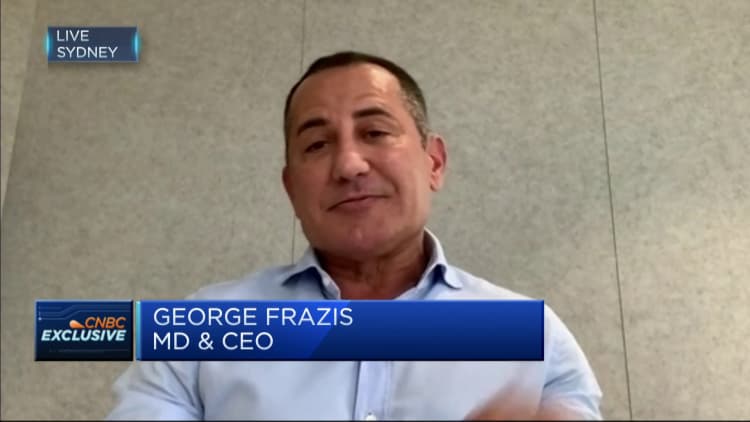A customer looking at the price of limes at a fruit stand in Sydney. According to Australia’s Bureau of Statistics, Australia’s inflation rate rose to 6.1 in June, a 21-year high.
Lisa Maree Williams | Getty Images News
The Bank of Queensland said it’s “quite bullish” on Australia’s “very robust economy” — but not everyone agrees.
“We’ve got a very robust economy, which I think when you look at the global challenges, the likelihood of us actually coming out of this in good shape is quite high,” George Frazis, CEO of Bank of Queensland, told CNBC on Wednesday.
“The [Reserve Bank of Australia] has moved fairly quickly to deal with inflation … that’s why I think there’s a good chance that we’ll have a soft landing in Australia,” Frazis said.
The RBA last week raised interest rates by 25 basis points to 2.6%, and cited the rising cost of living.
“As is the case in most countries, inflation in Australia is too high,” the Australian central bank said. “Global factors explain much of this high inflation, but strong domestic demand relative to the ability of the economy to meet that demand is also playing a role.”

Frazis cited “very high household savings” and “very low unemployment” as driving forces for the robust economy, despite pressure on housing prices.
“And this is on the backdrop where housing prices have actually increased by 39% over the last two years,” clarifying later that the figure referred to price increases in Australia between June 2019 to April this year.
Figures from Corelogic, one of Australia’s leading property data providers, indicate that national Australian housing values increased by 28.6% in the past two years. Some capital cities experienced price rises of 39% and more.
While the housing sector is highly vulnerable to higher interest rates, actual housing construction should remain solid for a while…
Shane Oliver
chief economist, AMP Capital
The linchpin of whether the housing market gets disrupted or not, according to Frazis, lies with the unemployment numbers, which he said were at an “all-time low.”
Australia’s unemployment rate stood at 3.5% in August, and household savings ratio fell to 8.7% in the March to June quarter.
“Our view is that [unemployment] is likely to continue and that is the key driver of housing getting disrupted or not.”
The bank’s CEO also expressed confidence that Australia is “well buttressed” against any kind of cataclysmic event within the housing market, citing homeowners were saving up and being ahead on repayments.
However, he maintained that disruption in the Australian housing market is “unlikely” to materialize.
No room for complacency
However, not everyone carries the same optimism as Frazis.
According to a financial stability review on RBA, Australia’s higher interest rates will increase borrowers’ debt repayments.
The report pointed out that income growth has not kept up with inflation in Australia and households are left with less capacity to service their debt. Additionally, a small share of borrowers with high debt and low savings are “vulnerable” to payment difficulties.

“Debt-servicing challenges will become more widespread if economic conditions, particularly the level of unemployment, turn out to be worse than expected and housing prices fall sharply,” the report continued.
In addition, Assistant Treasurer Stephen Jones cautioned that Australia’s economy is not “hermetically sealed” from the forecasted downturn of the international economy, Sky news reported.
Jones added that the country’s major trading partners are in a “precarious” and deteriorating” situation, which is going to impact Australia.
He also noted that as inflation rises, the economy slows around the world. This will in turn have an impact on Australia’s growth forecast.
“We just cannot be complacent about those numbers,” he said.
The International Monetary Policy Fund recently announced that one-third of the world is headed for a recession, which could include economic superpowers like China and the U.S.
Slower growth, but no recession
One economist suggested a modest outlook for Australia’s economy, and predicted the country’s growth will slow to around 2%, as opposed to falling into recession.
High household debt in Australia could could hurt consumer spending, according to Shane Oliver, chief economist at AMP Capital. However, inflation and lower wage growth also meant that this risk is lower, he added.
Australian dollar banknotes of various denominations are arranged for a photograph in Sydney, Australia, on Friday, Aug. 4, 2017. High household debt in Australia could risk compromising consumer spending, according to Shane Oliver, chief economist at AMP Capital. However, inflation and lower wage growth also meant that this risk is lower, he added.
Brendon Thorne | Bloomberg | Getty Images
“While the housing sector is highly vulnerable to higher interest rates, actual housing construction should remain solid for a while thanks to a big pipeline of approved but yet to be completed home building projects,” said Oliver.
The economist added that Australia’s gas prices have not shot up anywhere near as much as that in Europe, and the falling Australian dollar will provide a buffer against global weakness.
— CNBC’s Su-Lin Tan contributed to this report.

